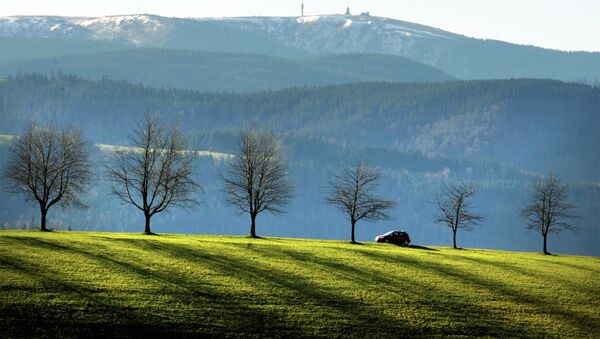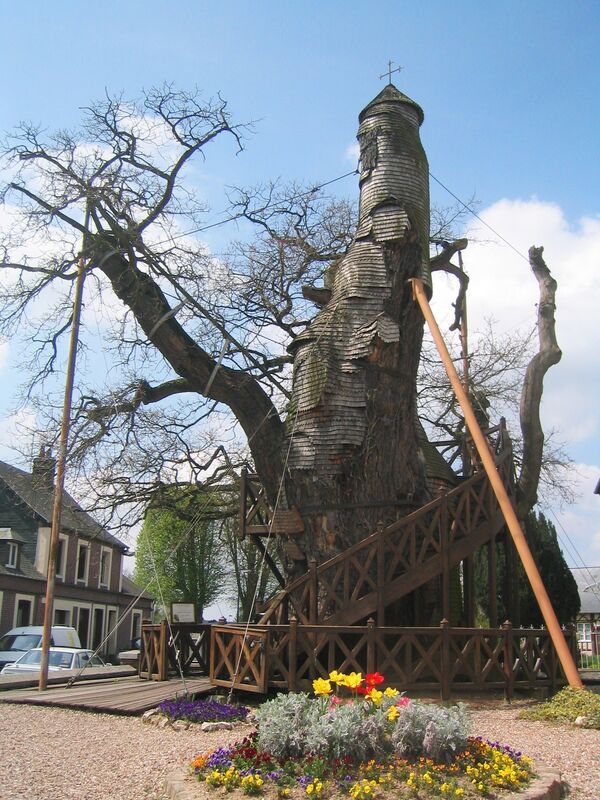In the 1970s and 1980s around a billion elm trees globally were killed by Dutch Elm Disease, but Mr. McBride says the biggest threat now was globalization and "stupid people."
"The profit-driven global economy is the biggest threat to us, to the planet and trees," says Rob McBride, who is better known as The Tree Hunter.
"Transportation of trees and soil material across continents, pallets and wooden stuff is how diseases are taken across," Mr. McBride told Sputnik.
He said climate change was also a big problem, especially in Iberia where a shortage of rain is threatening trees.
Hey up @devlin_jp iam just finishing my #European #Treeoftheyear @TreeoftheYear epic trip around #Contenders for crown of #Eurovision4Trees now in #Spain #Extremadura #CabezadelBuey #7AncientElms fancy a chat on the prog aftr im bk? Be #Treemendous im sure gracias rob pic.twitter.com/yeMzqVFErg
— Tree Hunter Rob #FBPE (@thetreehunter) 27 February 2018
'Eurovision For Trees'
Mr. McBride is in Spain for the European Tree of the Year competition which he describes as "the Eurovision for trees without the bad singing."
There are 13 entries this year including the Gilwell Oak in Epping Forest, near London, and a Russian tree known as the "elder of the Belgorod Forests."
@thetreehunter Rob McBride has been hiking by #cabezadelbuey and discovering #trees and folks are more joint than ever.#TREEmendous trip. Now you deserve a break Rob. @OlmosCabeza @OlmosBuey @TreeoftheYear #Spain pic.twitter.com/7Keucziz6y
— MEDIOSCABEZADELBUEY (@MEDIOSCABEZADEL) 26 February 2018
Online voting finishes at midnight on Wednesday, February 28, and the winner will be announced on March 21.
"They don't have to be especially big or old trees but trees which are special to their communities and have a good story, like the Whistler Cork Oak in Portugal, which gets its name from the amount of birds that sit in it," Mr. McBride told Sputnik.
Earlier this month Mr. McBride was in the news when he alerted the UK media to the fact that one of the oldest trees in Britain — which was planted 1,000 years ago when Offa's Dyke was built along the border of what is now England and Wales — had fallen down.
When he talks about the Buttington Oak, it is almost as if he is grieving the loss of an elderly relative and he feels guilty for not having done more to save it.
"If a tree expert had had a look at it they would have realized that we needed to cut it urgently and reduce its height and I feel a little bit guilty that I didn't really look at the tree properly when I look at the old photographs," he told Sputnik.
"I have had a lot of messages from people saying why was I making such a fuss of it but it wasn't a natural tree. It was a pollarded tree. Humans have been managing trees for thousands of years. For hundreds and hundreds of years we used to pollard trees and what was cut was used as fuel or animal fodder, known as tree hay. That stopped about 150 years ago when coal came along," Mr. McBride told Sputnik.
The thousand year old Buttington Oak planted on the England Wales border has fallen. #OffasDyke @arborsmarty pic.twitter.com/XYQVY2rVCL
— james rees (@jrees04) 24 February 2018
"Britain is the ancient rainforest of northern Europe. Over 50 percent of the ancient trees of northern Europe are in the UK. We have ancient yew trees, some of which are 4,000 or 5,000 years old, fantastic ages," Mr. McBride told Sputnik.
He believes more needs to be done to protect a small group of trees, like the Buttington Oak, which have been around for hundreds or even thousands of years.
"In Europe they generally have scheduled trees or heritage trees, which get more protection than in Britain, where we only have tree protection orders. If the Buttington Oak had been in many European countries it would have had a plaque on it and it would have been boxed and probably pollarded," Mr. McBride told Sputnik.
One British campaign that Mr. McBride is vigorously in favor of is the efforts by people in Sheffield who are battling the mass felling of trees by the city council and their contractors Amey.
#SaveSheffTrees
— Tweety Pops (@TweetyPopsicle) 27 February 2018
Getting nasty. Old man being pulled.@ameyplc workers joking about having a tape alarm.
Horrible language being used by @Ameyplc workers.
It's nasty here today. pic.twitter.com/5GANTAZyZf
He said 6,000 trees had been felled in Sheffield and the onslaught is continuing, with police officers controversially deployed to support the contractors as they remove trees.
"Ninety percent of the trees they have felled have been healthy. South Yorkshire Police have stepped up their operation to deal with the residents who are trying to protect the trees. It's the worst urban tree destruction in the world," he told Sputnik.
Mr. McBride said trees were not just important for wildlife but also for humans.
"The benefit of trees are many in terms of culture and heritage. But also there are many scientific studies about the benefits to physical and mental health. If you go out in the greenery and with trees you begin to feel a lot less stress, calmer, blood pressure comes down," he told Sputnik.
Trees don’t talk, so we raise our voices for them. 🗣️ Learn more about the unique challenges they face by reading our blog, #TreesInNeed: 📚 https://t.co/fo4FO16ddX.
— Tree of the Year (@TreeoftheYear) 26 February 2018




